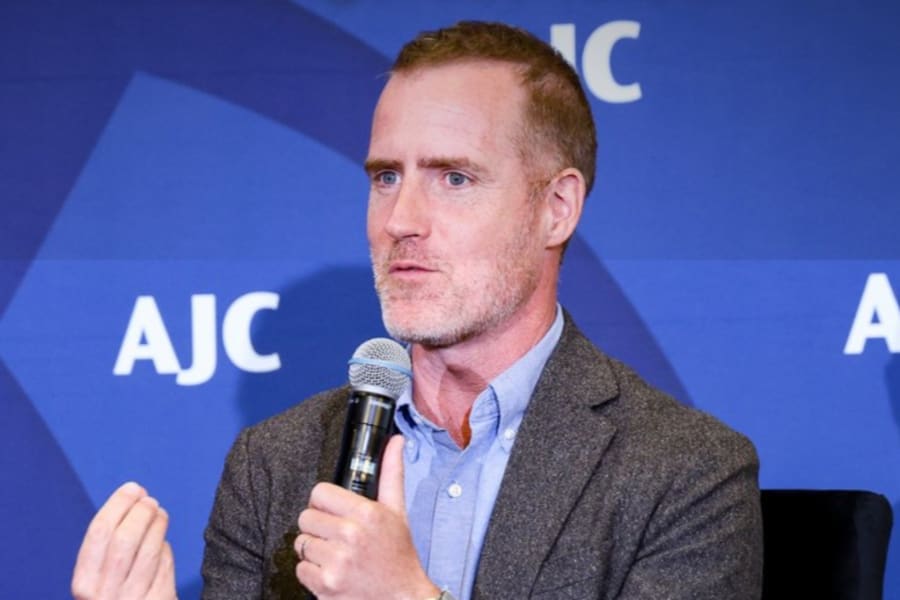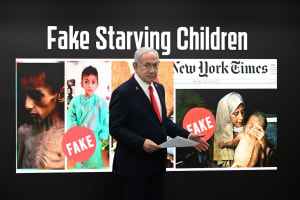Former AP reporter on media bias toward Israel after Oct 7 – podcast
AJC Global Forum 2025 interview with journalist Matti Friedman: It's no longer, ‘What’s going on?' but ‘Who does this serve?'

At the American Jewish Committee Global Forum 2025, award-winning journalist and former Associated Press correspondent Matti Friedman delivered a candid look at the bias, misinformation, and double standards shaping global coverage relating to Israel. From the rise of activist journalism to the endurance of skewed narratives, he revealed how the media can shape – and distort – reality.
Last month, the American Jewish Committee (AJC) released a podcast featuring highlights from the full interview. Friedman’s perspective comes from the inside: he worked in the AP’s Jerusalem bureau – the organization’s largest international office – between 2006 and 2011, and what he witnessed left him deeply concerned about how the Israel–Palestinian narrative is now being played out in today’s media climate.
“At the time… we had about 40 full-time staffers covering Israel – more than we had covering China, more than we had in India, more than we had in all of sub-Saharan Africa combined. I happen to think Israel is the most important country in the world because I live there. But if the news is meant to be a rational analysis of events on planet Earth, you cannot cover Israel more than you cover the continent of Africa. It just doesn't make any sense.”
During the interview, Friedman identified two overarching problems: the disproportionate scale of coverage and the narrow framing of the conflict.
The AP was giving an enormous amount of coverage regarding a “very small conflict in numeric terms and yet, there was this intense global focus on it that made people think that it was the most important story in the world. And it definitely occupies a place in the American political imagination that is not comparable to any other international conflict. So that's one part of the problem. That was the scope.”
He argued that the media’s insistence on describing events as an “Israeli–Palestinian conflict” distorts reality.
“Israel has unfortunately fought wars against Egyptians and Jordanians and Lebanese and Iraqis. And Israel's most important enemy at the moment is Iran, right? The Iranians are not Palestinian. The Iranians are not Arab. They're Muslim, but they're not Arab.”
Friedman said, “Clearly, there is a broader regional conflict…If you take a small story and make it seem big, and if you take a complicated regional story and you make it seem like a very small local story involving only Israelis and Palestinians, then you get the highly simplified but very emotive narrative that everyone is being subjected to now. And you get this portrayal of a villainous country called Israel that really looms in the liberal imagination of the West as an embodiment of the worst possible qualities of the age.
Since Oct. 7, 2023, rockets have been fired from Iraq, Yemen, Lebanon, Gaza, and from Iran.
“…There are in the Arab world 300 million people – almost all of them Muslim. And in one corner of that world, there are 7 million Jews who are Israelis. And if we zoom out even farther to the level of the Islamic world, we'll see that there are two billion people in the Islamic world…it's roughly a quarter of the world's population. And in one corner of that world, there are 7 million Israeli Jews – the entire Jewish population on planet Earth is a lot smaller than the population of Cairo. So the idea that this is an Israeli-Palestinian conflict where Israelis are the stronger side – where Israelis are the dominant actor and where Israelis are, let's face it, the bad guy in the story, that's a fictional presentation…”
Friedman noted that this was not unique to the Associated Press, but “true of the entire news herd.”
“It's true of the Times and CNN and the BBC…What happened was that news decisions were increasingly being made by people who were not interested in explanatory journalism. They were activists. Activists had moved into the key positions in the bureau and they had a very different idea of what press coverage was supposed to do.”
Friedman recalled previous examples in this career with the AP news bureau that were related to Israel, and how the narrative was spun to help one side of the conflict. He provided more recent examples, such as the media’s attempt to hide the deteriorating health condition of then-U.S. President Joe Biden in 2024.
He said he witnessed “the transformation of the important liberal institutions of the West into kind of activist arms of a very radical ideology that has as its goal the transformation of the West into something else.”
“I think that many people in the journalism world today view their job not as explaining a complicated situation but as swaying people toward the correct political conclusion.”
”Journalism is power,” he continued, “and the power has to be wielded in support of justice.”
In the immediate aftermath of Hamas’ Oct. 7, 2023 surprise invasion and terror attack on southern Israeli Gaza-border communities, the scale and brutality of the massacres forced the press to cover Israeli suffering. But, Friedman says, the discomfort was palpable.
“There were a few weeks after October 7 when they were forced to sympathize with Israelis… You knew that within a few weeks it was going to snap back,” he said. That “snap back” came quickly – most visibly, he says, during the false story about Israel bombing a Gaza hospital, a claim amplified worldwide before it was debunked.
“The story that the press is primed to cover is a story about villainous Israelis victimizing innocent Palestinians...the problem was that it hadn’t happened.”
Friedman traced the bias to a deeper shift within newsrooms.
“The question being asked was no longer ‘What’s going on?’ It was, ‘Who does this serve?’ That’s an activist question.”
This mindset, he argued, means that stories which cast Israel in a reasonable light often never see the page. He recalled a major peace offer from Israeli Prime Minister Ehud Olmert in 2008 – an offer the Palestinians rejected – that AP reporters were ordered not to publish because it would have “helped the wrong people.”
Inside Gaza, Friedman says Western outlets have long operated under Hamas restrictions – or worse, the terror group’s influence.
“Since 2008… the press has been essentially an amplifier for one of the most poisonous ideologies on earth. All of the information from Gaza comes from people who either identify with Hamas, are intimidated by Hamas, or belong to Hamas.”
Friedman explained that journalists were pressured to remove a key fact from a news story – namely, that Hamas fighters disguised as civilians were being counted as civilian casualties – because a reporter in Gaza had been threatened. He said the AP and other news outlets have complied with Hamas censorship, relying on casualty figures provided by Hamas, which shapes coverage to emphasize Palestinian deaths while downplaying losses and Hamas’ military strategy. Friedman said that’s why the public sees civilian casualties but rarely images of armed Hamas fighters – and why Hamas-issued casualty numbers are treated as fact.
For Friedman, the problem is structural – and irreversible.
“The old institutions… can’t be saved. It’s not about a lack of information. They define the profession differently.” The answer is not more letters to editors or attempts to “educate” hostile newsrooms. Instead, he calls for building new institutions – just as Zionism built a new model in the 19th century when old structures failed.
“At a dark time, you need real creativity,” he said.
It’s not about chasing away antisemitism – which he views as a permanent feature of history – but about strengthening Jewish life from within.
“If I had unlimited resources… I would make sure that young Jewish people have access to the riches of Jewish civilization… Hebrew is the key to Jewish life. If you have it, a whole world will open up – and it’s not one that antisemites can interfere with.”
It’s not just a critique of media bias – it’s a roadmap for understanding how narratives are built, how they persist, and why simply “fixing” coverage of Israel won’t solve the larger problem.
Friedman’s historical perspective and – at times – uncomfortable conclusions make this a must-listen episode for anyone who wants to understand the forces shaping public opinion after Oct. 7.
Click here for the AJC podcast with highlights from Friedman’s AJC Global Forum 2025 conversation.
Click here to watch the full interview.

The All Israel News Staff is a team of journalists in Israel.
You might also like to read this:
















